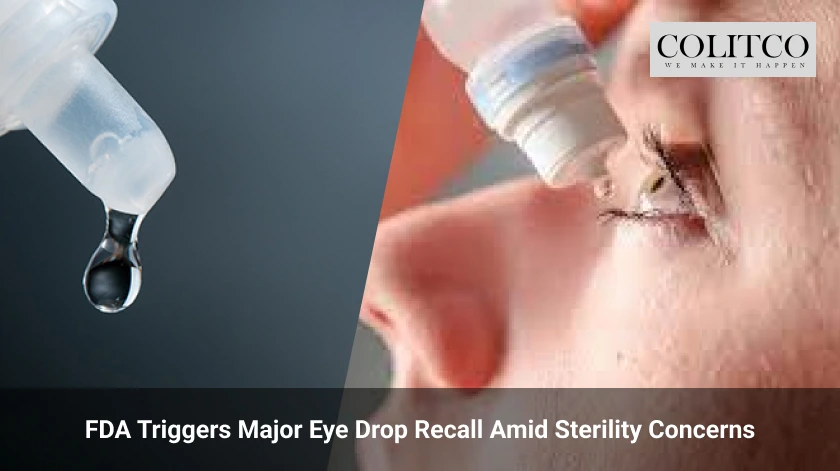Nearly 76,000 cases of eye care products have been recalled across the United States. BRS Analytical Service, LLC, initiated the voluntary recall following a U.S. Food and Drug Administration audit. The recall includes artificial tears and other lubricating eye solutions distributed between May 2023 and April 2025.
FDA Flags Manufacturing Deviations in Eye Drops
The FDA identified “manufacturing CGMP deviations” at BRS Analytical Service. These issues suggest the products may not meet federal quality standards. The company reported no known injuries or illnesses linked to the affected products. Given the unknown risks posed by the deviations, the recall remains precautionary.
Products Recalled and Drug Codes Identified
The recall includes five products sold under AvKARE distribution channels. Each product has a specific drug code and the number of cases affected.
- Artificial Tears Ophthalmic Solution
Drug Code: 50268-043-15
Cases Recalled: 13,872 - Carboxymethylcellulose Sodium Ophthalmic Solution 0.5%
Drug Code: 50268-066-15
Cases Recalled: 1,610 - Carboxymethylcellulose Sodium Ophthalmic Solution 0.5%
Drug Code: 50268-068-15
Cases Recalled: 32,876 - Lubricant Eye Drops Solution (Polyethylene Glycol 400 / Propylene Glycol)
Drug Code: 50268-126-15
Cases Recalled: 13,104 - Polyvinyl Alcohol Ophthalmic Solution 1.4%
Drug Code: 50268-678-15
Cases Recalled: 14,333
These products have expiration dates ranging from April 2025 to March 2027. Consumers may still have the products in use.
Consumers Urged to Discontinue Use Immediately
People using these items are advised to stop immediately. AvKARE has issued instructions for affected consumers seeking refunds. Users can fill out a recall form, submit it by fax or email, and return the item. AvKARE will provide a full refund, including shipping.
No Injuries Reported Yet, Recall Remains Precautionary
No health complications have been reported as of now. The FDA has not confirmed the exact risk of using the recalled products. The agency flagged concerns due to the deviation from Current Good Manufacturing Practices, which ensure pharmaceutical quality, sterility, and consumer safety.
Previous Warnings and Recall History Highlight Ongoing Issues
This recall follows a series of recent FDA actions against eye care products. In October 2023, the FDA warned about 26 over-the-counter eye products, which were available at major retailers, including CVS and Target. The agency cited potential risks of eye infections, including blindness.
FDA investigations revealed poor sanitation in manufacturing facilities. Some products tested positive for bacteria and failed sterility checks.
More Companies Flagged in FDA Crackdowns
In September 2023, the FDA warned eight companies marketing unapproved eye treatments. These included claims to treat pink eye, glaucoma, and cataracts. Some products contained silver, posing long-term health risks. Others showed contamination or failed sterility standards.
Contaminated Eye Drops Previously Linked to Severe Health Impacts
Earlier in 2023, EzriCare Artificial Tears were recalled after reports of infections. These infections led to hospitalisations, vision loss, and one death. The FDA confirmed contamination and issued a nationwide warning. The incident triggered a broader examination of sterility and production standards across the sector.
FDA Maintains Oversight of Eye Product Safety
The FDA continues auditing eye care manufacturing sites. It aims to prevent contaminated products from reaching consumers. The agency monitors for poor sanitation, mislabelled ingredients, and sterility failures.
The latest recall reflects ongoing vigilance following multiple safety breaches in recent years. Regulators remain focused on enforcing manufacturing compliance to protect public health.
Conclusion and Consumer Action Steps
Consumers must check their eye care products for the listed drug codes and expiration dates. Those possessing recalled items should stop usage and follow AvKARE’s return process. The FDA encourages vigilance and urges patients to consult healthcare professionals if symptoms occur.
The complete recall list and instructions are available on the FDA’s official website.












